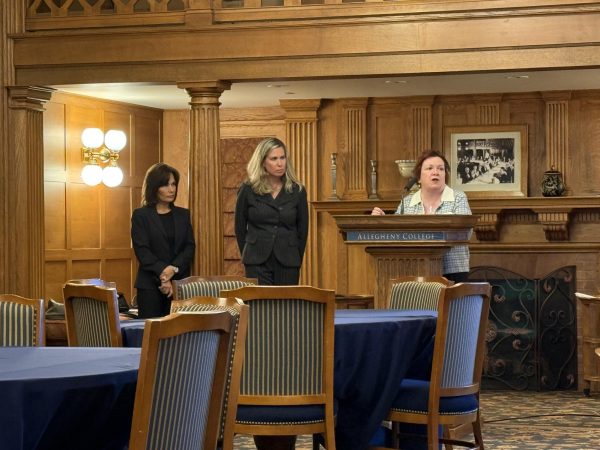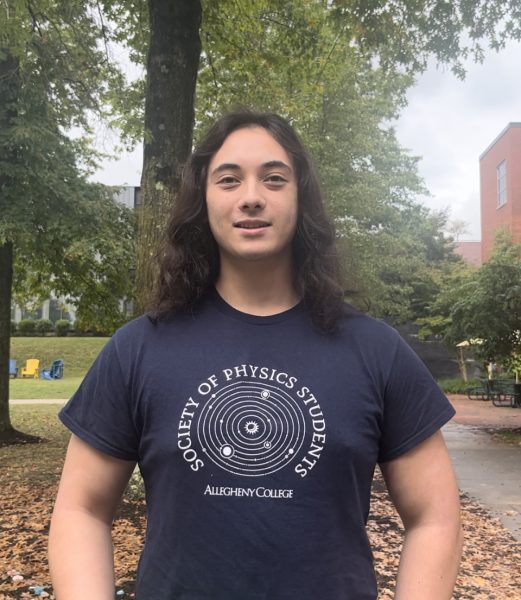ASG holds closed session midweek
The Allegheny Student Government began the process to grant itself the power to determine what clubs are members of the Culture, Identity, and Leadership Coalition in an “emergency” General Assembly on the evening of Wednesday, Feb. 15. ASG — as well as invited leadership from CILC clubs — gathered to discuss amendment 22-05, which would shift power to determine CILC membership from the IDEAS Center to ASG.
Publicly, proponents say the amendment would centralize ASG’s authority as the sole representative of students on campus. A document in the meeting minutes argues that the move is necessary because CILC clubs are currently required to meet with a staff member who makes them uncomfortable. But despite being advertised to the public, all but two minutes of the Feb. 15 discussion on the amendment were spent in closed session at the suggestion of ASG President Veronica Green, ’23.
“As a word of advice from me, during the discussion point of the amendment, I recommend that we move to a closed session,” Green told the Feb. 15 GA. “Therefore, if there’s any information provided from Cabinet or our guests, that they do not fear some sort of retaliation or any sort of journalistic writing from The Campus.”
On a motion from Class of 2025 President Nicole Recio Bremer, the Senate voted 11-4 to close the meeting. Anyone who was not a member of ASG or a CILC guest was removed from the session until the meeting reopened more than an hour later.
Article II, Section 5, Subsection 4 of the ASG constitution stipulates that a closed session can be convened “if one of the following conditions are met:
a. The General Assembly is discussing the appointment, the performance, or the dismissal of a member of cabinet, senate, or an appointed member of a College Committee.
b. The body must discuss the reallocation of any ASG specific funds.
c. All discussions held in a closed session shall remain in the closed session and shall not be discussed thereafter, this includes the closed section discussion within the minutes.”
In an email to The Campus after the meeting, Green said that the ASG constitution’s wording regarding closed sessions was flexible enough to allow uses like the Feb. 15 meeting.
“The constitutions verbiage is not that we can ‘only’ have closed sessions, the examples provided work as examples,” Green wrote. “The content of the meeting required that ASG protect those who wanted to voice their opinions from retaliation or public documentation, such as The Campus.”
While the contents of the closed session are not to be discussed outside of the session, the meeting’s public minutes include a document titled “Summary of Events” that alleges a term used in several emails from IDEAS Center Director Lisa Nicole Smith was transphobic. Screenshots of the emails were linked in the document.
The document was written by Co-Director of Student Affairs Cam Lesher, ’24 — who also serves as the president of Allegheny’s All Gender Equity Society. Lesher co-introduced the amendment with Green.
“I feel that the proposal that we have is important for ensuring that student groups that belong in CILC will not be forced to leave CILC because of being uncomfortable meeting with Lisa Nicole since she previously expressed that CILC Presidents that do not have monthly 1 on 1 meetings with her are not abiding by the rules of CILC and their status would be reconsidered,” Lesher wrote in the document.
Both Lesher and Smith declined to comment.
When The Campus began contacting CILC members about the allegations, Green wrote in reply to a request for comment that she was “worried about the nature of this article.”
“I respect The Campus and the want to write in upcoming changes in ASG,” Green wrote. “However, I am also aware that others have been emailed to comment on ‘accusations against Lisa Nicole.’ The only individual who discussed Lisa Nicole, was Cam Lesher and the minutes reflect that.”
At the Feb. 21 GA, Senator Jasmine Meyer Jaafari, ’23, said that questions about Smith’s conduct were central to the Feb. 15 closed session and a motivating factor behind the prroposal to amend the ASG constitution.
“The concern that we brought up with Lisa Nicole was that she was going to take some sort of retaliatory action to hurt the CILC organizations,” she said during a discussion on the topic.
However, Green pushed back on the idea that the amendments proposed were related to allegations against Smith.
“The motivation behind the amendment of last week was not directed at the current director of the IDEAS Center,” Green said. “It was meant because, in my time, I’ve had to explain the CILC constitution to three people in the IDEAS Center. There’s so much turnover there that the concept of being able to understand the IDEAS Center role with so many people in collaboration with ASG, there’s too much confusion, and there’s also too much personal bias. ASG has more checks and balances in order to determine CILC status rather than it being one person.”
CILC does have its own power structure. Established in 2021, the CILC constitution outlines a second legislative body similar to ASG but explicitly to support and represent “systematically marginalized student populations.”
While the CILC constitution does not say who can determine which clubs are in CILC, Article VII, Section 3 of the CILC constitution stipulates that ASG’s powers are to “provide funding for all organizations” and that “any amendments to the ASG Constitution must be voted upon in the Senate passing with the requirements in both constitutions.”
Furthermore, Article II, Section 4, Subsection II of the CILC constitution states, “Any action by Allegheny College and the Allegheny College Student Government within CILC not specifically outlined within this Constitution violates the spirit of cooperation between these interdependent bodies.”
However, during the few minutes of open discussion on Feb. 15, Class of 2026 President Sam Ault argued that giving ASG authority over CILC clubs centralized student leadership over all clubs.
“This amendment is going to make a lot of sense, just in that ASG is supposed to be the representative body of the student body, and we are in all other cases the orchestrator of clubs,” Ault said. “This amendment just makes a lot of sense logistically with ASG being placed in charge of the clubs. It’s true of every other club. It should be true of CILC clubs.”
It’s unclear what weight the CILC constitution holds, given there is no record that the body has ever met as a legislature. According to ASG Parliamentarian Ankitha Pamula, ’24, the CILC constitution is currently being reviewed by ASG Director of Diversity, Equity and Inclusion Jaelyn Valentin, ’25, who called the document a “hot f——- mess” at the Feb. 21 GA.
On a practical level, CILC is a group of 20 clubs for under-represented students that have access to additional workshops, collaboration opportunities and funding through the IDEAS Center, with the power to determine which clubs are in CILC resting with the IDEAS Center Director.
The Feb. 15 meeting was the first time the General Assembly convened outside of its regular schedule since digital record-keeping began in 2013, and was announced just over 24 hours before the meeting was gaveled to order.
“The urgency behind the meeting was due to ASG being made aware of behaviors and interactions between CILC organizations and the IDEAS Center,” Green wrote in an email to The Campus after the Feb. 15 session. “The ‘emergency’ aspect was that we needed to make a decision on this amendment prior to next Tuesday’s meeting. Given the situation, we could not wait for the next two Tuesdays to vote on this amendment. I am sure other senators will agree.”
At least one senator did not agree with Green’s explanation: During the Feb. 21 GA, Class of 2023 President Shira Haus said that despite what she saw as legitimate concerns from CILC clubs, the process felt rushed. Haus did not specify what those concerns were.
“We formed this amendment in response to real concerns coming from CILC members and CILC board members,” Haus said. “Obviously, we can keep working on it, but I also have to say the original amendment was proposed pretty abruptly, and we didn’t really talk about the amendment. We talked about other things — which are important, obviously — but we didn’t really discuss the amendment and I feel like we need to consider some alternatives.”
Haus’ alternative was an alternative constitutional amendment that would have shared the decision-making powers on CILC status between CILC, ASG and the IDEAS Center.
Though the original amendment — 22-05 — was approved for the first time on Feb. 15 by a vote of 13-1, the amendment failed its second vote on Feb. 21, with senators split 7-7. The second amendment supported by Haus — amendment 22-06 — was introduced at the Feb. 21 GA but tabled for later discussion after a 35-minute debate on the topic. For now, the power to determine CILC status remains with the IDEAS Center and its director.

Sami Mirza is a senior from many different places. He is majoring in International Studies with a focus on the Middle East and North Africa and minor in...






ASG Attendee • Feb 24, 2023 at 10:36 am
The most laughable part about Veronica’s statement is the fact that she chose the WORST argument to prove her point. Showing that she clearly hadn’t read her own government’s binding document, there is no way, shape, or form that it can be argued that “constitutions verbiage is not that we can ‘only’ have closed sessions”. It literally says if the circumstances meet “ONE OF THE FOLLOWING”. She can argue that clause “c” meets the requirements (it does not), but that would classify as one of these so called ‘examples’. There is no plausible way to spin this in her favor, at all.
Not to mention, the complete and utter fact that Green is attempting to salvage the confidentiality of the closed session and failing miserably.
If Cam Lesher was the only person to discuss Lisa Nicole, then senators have made it known that they were only using the basis of Cam’s claims to make this decision. But then, Veronica wouldn’t have felt the need to file judical complaints against senators who spoke out about “personal experiences” in the closed session. If those personal experiences were not about Lisa Nicole, then what would they have been about? The failures of the IDEAS center and it’s quick turnover rate like Veronica was explaining? That’s not a conversation that needs to be in closed session, as it is highlighting a concern that Veronica herself brought up publically.
Secondarily, if the amendment wasn’t about Lisa Nicole, then why did such accusations need to be discussed? Why are we still talking about her? And clearly, if it wasn’t about Lisa Nicole, the cabinet had failed to make that clear to senators.
Finally, it doesn’t look like Veronica got her wish either. The amendment was so important it “couldn’t wait”, but is now going to have to wait two more weeks, as her co-written amendment failed. If only all of the CILC groups were contacted to make that amendment, maybe this sense of urgency she had would’ve been fulfilled.